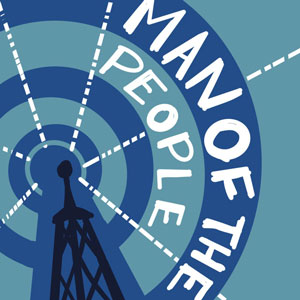
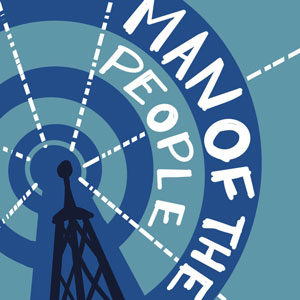 [rating=3]“Man of the People”, a new play by Dolores Díaz, directed by Anna C. Bahow, tells an interesting biographical account about Dr. John R. Brinkley (Michael Peters), a quack physician who effectively uses the new technology of radio to peddle his snake oil cures to listeners throughout the United States. He becomes very popular and very rich as a result, even during the years of the Great Depression. Although Brinkley is initially viewed in the popular mind as being some type of savior, those in the (legitimate) medical field see him for what he is: a no-good charlatan, who needs to be stopped.
[rating=3]“Man of the People”, a new play by Dolores Díaz, directed by Anna C. Bahow, tells an interesting biographical account about Dr. John R. Brinkley (Michael Peters), a quack physician who effectively uses the new technology of radio to peddle his snake oil cures to listeners throughout the United States. He becomes very popular and very rich as a result, even during the years of the Great Depression. Although Brinkley is initially viewed in the popular mind as being some type of savior, those in the (legitimate) medical field see him for what he is: a no-good charlatan, who needs to be stopped.
The show compresses a good number of years in the lives of Dr. Brinkley and his wife Minnie/Minerva (Joan Nahid)—that is, from the early 1920s through 1940—and largely focuses on the doctor’s so-called “goat gland surgery”, having to do with his pioneering treatment for erectile dysfunction. In the first scene, we see how Kansas farmer Mr. Stitsworth (Rob Koon) suggests the goat idea to Brinkley. Then after the doctor performs the operation, he offers this “cure” to the general public. As it turns out, this unneeded operation doesn’t solve the problem and causes too many men to die or become seriously mauled. Such are the findings of Dr. Morris Fishbein (Andrew Bosworth), the editor of the Journal of the American Medical Association, who feels that offering a potential cure to patients without any scientific evidence of safety or effectiveness is very dangerous. When he was a young man, Fishbein witnessed a cancer doctor with wrongheaded treatments and resolved to come down hard against quackery should he ever become a physician. And now, he has Brinkley in his sights. Some of the best parts of the show have to do with confrontations between the two men, such as Brinkley’s lawsuit against Fishbein for libel. The segment about how the Kansas medical review board looked into Brinkley’s medical license is also noteworthy, although the show never really brings out that his degree in medicine was purchased from a diploma mill (or perhaps I missed this important fact).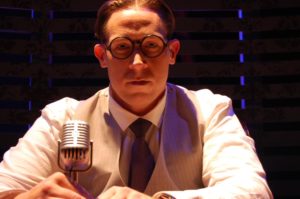
In an intriguing subplot, Fishbein’s mother Fanny (Sandy Spatz) is an avid radio listener and believes that Brinkley’s cures may indeed be possible. Fanny suffers from a terminal disease and enjoys listening to what the radio doctor has to say. She feels that medicine is not only what science teaches us, but there’s a whole lot more. “Food is medicine,” she says in one of her dialogues with her son. While Fishbein realizes that Brinkley’s broadcasts give his mother some measure of hope that she might live a longer life and possibly beat her disease, he doesn’t believe that giving someone false hope is appropriate. Fishbein is realistic (if not pessimistic) when he tells his mother bluntly that people become ill and die—and that, at some point, the physician can only do just so much. Yet there is a moment when he talks to his associate Dr. Maxwell (Shawn Smith) about whether or not it is wise to disabuse this mother of the notion that she might become well again, even though the odds are highly against it.
In contrast to the straight-forward progression in the way that this tale is told, the bookends of the very first scene and the very last scene are especially clever. There is original version of events and then there is the second version, each having to do with the supposed origins of the goat gland idea. Do the differences depict the failings of selective memory? Which narrative represents the true state of affairs and which one is made-up? Is one a subjective impression and the other the objective truth?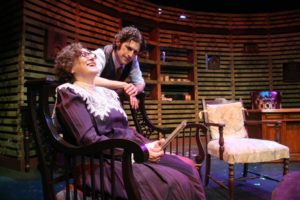
Unfortunately, the story needlessly splinters in several directions. . For example, there’s the issue of how the doctor doesn’t practice what he preaches regarding his own family life. So when he finds himself unable to father a child with Minnie, he does not consider performing the same surgery on himself that he has been recommending to others. He might already know that he is a fraud, or maybe he is just scared. (Note that in the biography of Dr. Brinkley in Wikipedia, he previously fathered a child with another wife, but I digress.) Then there is the possibility that Minnie has been unfaithful to him when she finally becomes pregnant with their son, but it is uncertain how this juicy gossip is relevant to the tale. There is also the portion about Fishbein’s family. While it is established that they are Jewish, I couldn’t figure out the relevance of the story of Morris’s deceased father (and Fanny’s husband) once having a tattoo with an earlier girlfriend’s name on it.
Set design is by Jonathan Berg-Einhorn, who also doubles as the tech director. He and props designer Laura De Croocq have done splendid work. The ample wooden desk, the ornate wooden chairs, the antique lamps, etc., create a faithful reproduction of a doctor’s office/living room circa 1930s. Inserting all of those antique radios into the wall as well as depositing several floor model radios of different vintages throughout the set emphasizes Brinkley’s commitment to broadcasting nationwide. What gets great marks is how well this exact set can house so many different locales, each of which becomes important in different scenes. Due to the fine work of director Anna Bahow, sound designer Hannah Foerschler, and lighting designer Ellie Humphrys, the music varies from songs that one might hear in Chicago (where Fishbein worked as part of the American Medical Association), those with country-like themes (used to represent Dr. Brinkley’s practice in Kansas) plus music meant to represent life in Texas. Whenever the music plays, the lighting nicely changes, which not only demarcates one scene from another but forms an aural “establishment shot.” Intimacy design by Charlie Baker is nicely done, and Andrés Mota has created outfits genuine to the era. Note that there is a poster in the lobby that details the life and times of Dr. Brinkley, and this is helpful in providing some background information for the performance.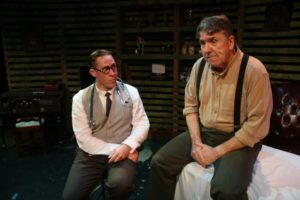
Please remember that I am reviewing this show from the perspective of 2022, not 1922 (when commercial broadcast radio first began) or 1962 (when medical doctors were considered gods, especially following the success of the polio vaccine). In the interests of full disclosure, I happen to think that the conventional medical profession does not have a monopoly on medical knowledge. If a patient finds alternative medicine to be useful, then why not prescribe it? If a placebo can make a person’s health improve if they believe in its efficacy, then this can be a good thing. All that being said, a medical imposter can do great harm to individuals and society by peddling false hope and promoting bogus cures, especially those that can kill or severely injure or maim people.
But then we get into the politics of which treatments are real and which are bogus. Dr. Brinkley’s patients obviously thought that the cures which he was advocating were real and necessary. (Think about the modern controversies surrounding ivermectin and hydroxychloroquine as treatments for COVID and consider those who question the efficacy of vaccines or the legitimacy of big pharma.) So ultimately, we as individuals must decide what makes sense scientifically (or otherwise) in consultation with our medical and health professionals. We also need to determine the lengths that we will go to preserve health, wellness, and quality of life for ourselves and our loved ones. For example, would we be willing to try out the untested goat gland treatment if it were being cast as a clinical trial? This production of “Man of the People” gets us thinking about the role of medicine in our daily lives and the uses of science. It also points up the importance of credentials and licensing and what it means to be a professional physician or a quack, even if the average person may not be able to tell the difference.
Stage Left Theatre’s “Man of the People” is playing through November 20, 2022, at Chicago Dramatists, 1105 W. Chicago Avenue, in Chicago; entrance off the corner of Aberdeen and May Streets.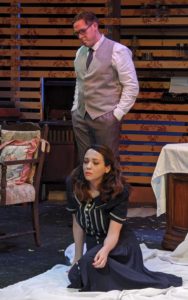
General Admission Tickets are $35.00 – $40.00.
Students are $25 with coupon code “Student.”
Performance schedule:
Thursdays -8:00 p.m. – $35
Fridays and Saturdays – 8:00 p.m. – $40
Sundays – 2:00 p.m. – $35
Additional performances:
Monday, November 7, 2022 at 8:00 p.m. – $25 (Industry Night-and Special Pre-Election Performance)
Monday, November 14, 2022 at 8:00 p.m. – $25 (Understudy performance)
Tickets are available online through the Stage Left website https://www.stagelefttheatre.com/motp.
For questions or assistance, email tix@stagelefttheatre.com or call 773-883-8830.
For general information or to purchase www.stagelefttheatre.com.
To see what others are saying, visit www.theatreinchicago.com, go to Review Round-Up and click “Man of the People”





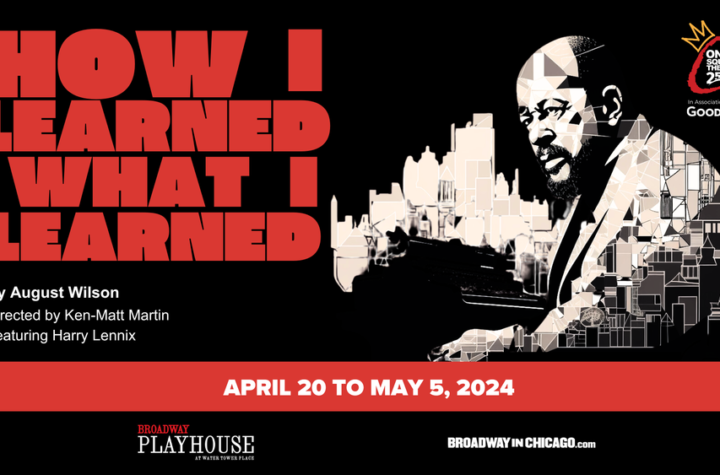
More Stories
“Barefoot in the Park”
“Joe Turner’s Come and Gone”
“How I Learned What I Learned” reviewed by Julia W. Rath